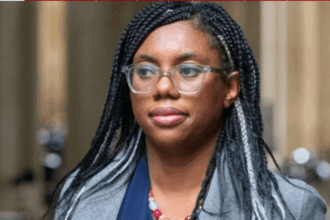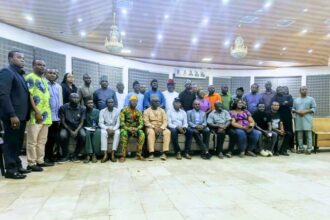A gunman with suspected far-right links shot dead nine people, some of them migrants from Turkey, in an overnight rampage through a German city before killing himself, officials said.
Chancellor Angela Merkel condemned the attack on two shisha bars in Hanau, near Frankfurt. She told reporters it appeared to have been motivated by the “poison” of racism that was to blame for “too many crimes”, as Turkish officials called on her government to respond robustly.
The presumed killer was a 43-year-old German man who held a firearms license and was a member of a gun club.
Police chased a car used to leave the scene of one shooting to its owner’s address, where they found his body and that of his 72-year-old mother, said Peter Beuth, interior minister of Hesse state, where Hanau is located.
Federal prosecutors said they had taken charge of the case due to its likely extremist motive, and newspaper Bild said the suspect had expressed far-right views in a written confession.
In shisha bars, customers share flavoured tobacco from a communal hookah or water pipe. In Western countries, they are often owned and operated by people from the Middle East or South Asia, where the use of the hookah is a centuries-old tradition.
Turkey’s ambassador in Berlin, Ali Kemal Aydin, told state broadcaster TRT Haber that five Turkish nationals were among the dead.
“We expect German authorities to show maximum effort to enlighten this case. Racism is collective cancer,” Turkish presidential spokesman Ibrahim Kalin said earlier on Twitter.
ALSO READ: Algeria ready to mediate in Libya ceasefire talks
The Confederation of the Communities of Kurdistan in Germany said several victims were Kurdish, expressing anger that Germany’s political leaders “are not resolutely opposing right-wing networks and right-wing terrorism.”
Germany, which is home to three million people of Turkish origin including one million ethnic Kurds, has seen its political landscape polarized in recent years, with a wave of immigration and a slowing economy helping to fuel support for extremist groups at both ends of the spectrum.
In October, an anti-Semitic gunman opened fire outside a German synagogue on Yom Kippur, the holiest day of the Jewish year, and killed two people as he live-streamed his attack.
Authorities have banned some far-right groups endorsing violence, while Germany’s post-war centrist political consensus has been undermined by growing support for the anti-immigrant Alternative for Germany (AfD) party, notably in the former-Communist eastern states.
Social Democrat Vice-Chancellor Olaf Scholz said that 75 years after the Nazi dictatorship, right-wing “terror” had returned. “We must defend our liberal democracy,” he posted on Twitter.
Police said there were no indications that other suspects were involved in the Hanau attack.
They said investigations into the identity of gunman and victims were ongoing and, Beuth said, whether any letters of confession had been written.
The minister said the suspect was in legal possession of weapons and belonged to a shooting club, and Bild said ammunition and gun magazines were found in the suspect’s vehicle.
Can-Luca Frisenna, whose father and brother run one of the two bars attacked, said he rushed there after learning about the shooting.
“I heard my father was affected and my little brother, they run the kiosk,” he said. “… They were horrified and they were crying and everything. So everyone was shocked.”
At one of the bars on Thursday morning, forensics police in white overalls inspected the crime scene, cordoned off close to Hanau’s historic market place. Nearby, traffic flowed as normal and commuters waited for buses.
Kadir Koese, a 38-year businessman who runs a bar opposite one of those attacked, described hearing shots being fired.
(Reuters)








